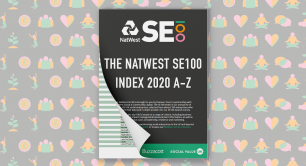We will survive: SE100 winners see hope after Covid-19 crisis
The 2020 NatWest SE100 Social Business Award winners convinced the judges that they ran solid and successful enterprises in 2019. But how have they been weathering the Covid-19 storm?
All of this year’s SE100 winners believe that their organisation will survive the coronavirus crisis, and three of them were making more impact during lockdown than before.
The ten winners of 2020’s NatWest SE100 Social Business Awards were announced on 20 May. The SE100, now in its tenth year, celebrates the growth, impact and resilience of the UK’s best social ventures. The award winners represent outstanding achievers in eight categories selected from almost 300 applicants.
Although this year’s awards ceremony could not take place in London as usual, the Pioneers Post team delivered the good news to the winners via Zoom calls in May. All of our winners’ applications were submitted before the pandemic took place, so, while we had a good idea of their achievements during 2019, we took the opportunity during the calls to ask how their enterprises were faring under the UK’s pandemic lockdown.
We asked the nine social enterprise winners a series of questions about their business. As one of the ten winners is a social investor rather than a social enterprise, we had a different discussion with them – see box below.
The 2020 winners of the NatWest SE100 awards*
Growth Champion: Hubbub Enterprise
Impact Management Champions: Shared Interest Society and Skills Builder Partnership (joint winners)
Trailblazing Newcomer: Projekt 42
Storyteller award winner: GLL
Social investment award winner: The Social and Sustainable Housing fund created by Social and Sustainable Capital and Hull Women’s Network
Leadership award winner: Mark Simms, CEO, P3 Charity
Resilience award winner: The Sewing Rooms
Environmental Champion: Point and Sandwick Trust
*Click through to read each winner’s story
What did the NatWest SE100 winners tell us?
- Do you expect to survive or go out of business as a result of the pandemic?
All nine enterprises responded with an emphatic message that they would survive, even though most of them are facing enormous challenges.
“We will survive and thrive,” said Lisa Hilder, trustee of Hull Women’s Network, “because we have a firm foundation for what we do. The pandemic hasn’t tripped us up in delivering our plans.”
“We expect to be doing more of what we are doing now,” said P3’s CEO Mark Simms, who saw a big opportunity to support more vulnerable service users in the future.
“We will survive, but it’s very hard to say how long it will take to get back on our feet,” said Alex Robinson, managing director of Hubbub Enterprise.
We will survive, but it’s very hard to say how long it will take to get back on our feet
Point and Sandwick Trust, the UK’s biggest community owned wind farm, saw the income from the electricity it generates plummet as prices fell. But a floor price locked into its contract would save it, explained development manager Calum MacDonald. “We will survive,” he said. “As soon as electricity prices go up, then we will be back where we were.”
Two commented that their organisations might change in some way in the coming months. Skills Builder Partnership, for example, works with children and young people to help them develop essential employability skills such as teamwork and leadership. With the continuing uncertainty about how schools and colleges will operate during the next academic year, founder and CEO Tom Ravenscroft said that the “delivery mechanism” might have to be adapted. “We are trying to think about how to scale our work and our impact in different ways,” he said.
- Are you making more positive impact, less positive impact or the same as before the Covid-19 crisis?
 Three of our winners said they were making more positive impact than before the crisis.
Three of our winners said they were making more positive impact than before the crisis.
Mark Simms, CEO of P3, told us that the enterprise was working with hundreds more people than usual as local authorities had requested the social enterprise's help to support homeless people as part of their pandemic emergency response measures. This was a great opportunity, said Simms, to make a real and lasting difference to these people’s lives by getting them into their own accommodation.
- READ MORE: "We're settling into the fact that there is no normal" – Our Voices from the Frontline in-depth interview with Mark Simms
Lisa Hilder from Hull Women’s Network said that there had been a spike in demand from service users as domestic violence cases soared under lockdown. She reported that the charity had been able to house everyone in need and offer them the backup they need.
The Sewing Rooms had been reaching more people in recent months through its switch to making protective face masks. Although the textiles and soft furnishing enterprise’s orders from hotels and other customers stalled when the crisis hit, founder Paula Gamester told us that as soon as she and her colleagues heard that frontline workers were short of personal protective equipment (PPE), they got 50 of their ‘silver sewers’ and other volunteers to start making face masks out of anti-microbial material donated by one of their suppliers. They donated thousands of masks to key workers – including a local priest. Now masks made by The Sewing Rooms are available to the general public to buy online.
- Are you losing money, making money or breaking even at the moment?
 Half of our winners reported they were losing money during the crisis while the other half were breaking even. None felt that they were enjoying a period of growth. (This question wasn’t relevant to Shared Interest, as a not-for-profit co-operative investor.)
Half of our winners reported they were losing money during the crisis while the other half were breaking even. None felt that they were enjoying a period of growth. (This question wasn’t relevant to Shared Interest, as a not-for-profit co-operative investor.)
The social enterprises that relied on daily custom from the public had been particularly hard hit. GLL was forced to shut the doors of its 270-plus leisure centres (which it operates under the Better brand) and five libraries across the UK. This meant a huge loss in income and it had furloughed 10,500 of its 13,000 staff. It had also called upon its local authority partners to top up the wages of its furloughed staff from the 80% that central government provides to 100%.
Projekt 42, a social enterprise gym and wellness centre in Edinburgh, had also been forced to cease its face-to-face operations which meant an 80% loss in revenue. “It’s a really hard lesson,” said founder Sara Hawkins.“If we had been grant-funded, if we hadn’t tried to be the best social enterprise we could, we would have been in a better position.” Nevertheless, the enterprise was working hard to maintain its connection with its customers via social media, so that they would be keen to return as soon as it could open again.
If we had been grant-funded, if we hadn’t tried to be the best social enterprise we could, we would have been in a better position
- At the end of your current financial year, do you expect your turnover and profit to be less, more or the same as projected?

Two of our winners anticipated an upturn in their profits and turnover by their financial year end.
One of them, Hull Women’s Network, was increasing its property portfolio thanks to its SE100 award-winning new investment deal with Social and Sustainable Capital – this was unaffected by the pandemic.
And Shared Interest Society, which enables UK people to invest in businesses run by people in remote and disadvantaged communities overseas, had seen an upturn in new investments during the coronavirus crisis. “We’re predicting by the end of the year we will be ahead of budget,” said managing director Patricia Alexander. “The people that fund Shared Interest are being loyal and topping up their accounts, and people are still opening new accounts.”
Others, including SE100 Growth Champion Hubbub Enterprise, predicted a fall. Hubbub had boasted a year-on-year revenue growth of 96% at the end of 2019, but the pandemic had stalled this. Most of the organisation’s work involved getting people together, explained managing director Alex Robinson. The enterprise encourages greener living by campaigning and collaborating with local authorities, businesses and community groups. Its ‘plastic fishing’ activity, for example, takes schoolchildren or businesspeople out on a boat made from recycled plastic to fish waste out of London’s river Thames.
“It’s the end of the growth story for the time being, for sure,” said Robinson. Fortunately, Hubbub’s recent success meant that it had a comfortable financial cushion, which was giving the team the opportunity to consider how the enterprise would adapt in the coming months.
It’s the end of the growth story for the time being, for sure
Support from government and others
We also talked to our award winners about the support that they have received to help them through these challenging months. Six of them had made use of the government’s Coronavirus Job Retention Scheme to temporarily furlough staff at the same time as being funded by the government to pay them 80% of their salary. Two had applied for other Covid-19 specific support – one was waiting to hear about a grant application to the National Lottery Community Fund and the other had made use of Business Rates Relief.
Those that had live investments all reported that their investors had been helpful and understanding, although most of them haven’t yet needed to amend any repayment terms.
Looking to the future, when we spoke to the winners in mid-May, many of them were uncertain how the coming months would unfold. However, all were preparing for different eventualities. As Tom Ravenscroft, founder and CEO of Skills Builder Partnership, said: “We will have to deal with a lot more uncertainty going into next year.”
The social investor’s viewpointOne of the SE100 winners is social investor Social and Sustainable Capital. This is what managing director Ben Rick told us: “The crisis has had less impact on us as social investors than the organisations that we support. The most important thing for us is to check the organisations are ok and if there is anything that we can do to help them. Most of them – although they have been affected by the pandemic – haven’t required any financial intervention. We have been processing a few requests to change the terms of their investment. “We are also busy with applications for new loans. There are organisations out there that are on the back foot, but others are already having that conversation about what to do when we come out of this. “We had a pretty brilliant pipeline of borrowers and investors. Our potential borrowers – some of them have been pushed back in what they are doing – but they are still there. With investors – given what’s happened in global markets – that conversation is going to be much harder. We are going to need to make sure there is enough capital there for us to be able to continue helping charities and social enterprises.” |
We're working hard to provide the most up-to-date news and resources to help social businesses and impact investors share their experiences and get through the Covid-19 crisis. But we need your support to continue. As a social enterprise ourselves, Pioneers Post relies on paid subscriptions and partnerships to sustain our purpose-led journalism – so if you think it's worth having an independent, mission-driven, specialist media platform for the impact movement, please click here to subscribe.




